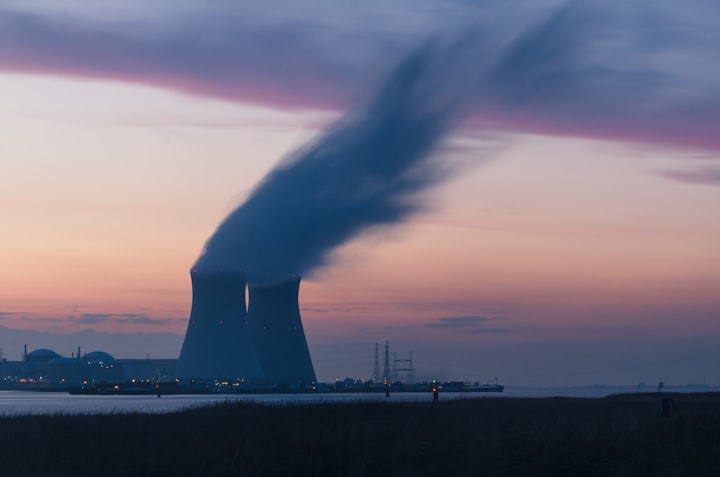Is Nuclear Energy a Sustainable Solution?
The Benefits and Risks of Using Nuclear Power Plants as an Energy Source

Ah, uranium. The only substance that compares to its radioactivity is public opinion of it. Due to more than half a decade of horrendous accidents and deplorable warfare, paired with rosy images of a retro-futuristic paradise, opinions on the subject are diverse as they are vitriolic.
But, is nuclear energy actually viable? Is it safe and abundant enough to bring about the clean energy utopia of our dreams? I trawled the recesses of the internet to discover the answer:
The Benefits of Nuclear Energy
Nuclear Power has a Shockingly Low Carbon Footprint
Nuclear Energy is one of the best options for energy in regard to carbon emissions. Not just does it have a lower carbon output than traditional energy sources like coal, natural gas, and biomass, but it also outshines green energy alternatives like solar and geothermal! According to World Nuclear, nuclear power plants produce the same amount of CO2 emissions as wind, which is one-third the amount that solar energy produces!
Nuclear Energy is Cheap to Maintain
Though the initial investment to build a reactor is costly, once a nuclear energy facility is built, it’s more cost-effective than other sources of energy. Out-competing solar, natural gas, and wind in energy cost per kWh, the energy source can act as an investment that actually saves governments a significant amount of money.
Rain or Shine, Nuclear Energy Works
A majority of clean energy options require reliance on weather and climate. Considering the ongoing changes to our climate right now, relying on these systems comes with an inherent risk. Powering our cities with the movement of rivers is unreliable amid droughts and rivers drying up around the world. And, relying on wind and sun can feel risky when the weather changes. Nuclear power is less affected by such constraints, operating regardless of most environmental changes.
Nuclear Energy is Already Powering America
As of 2021, we’re already powering 20% of the US power with nuclear reactors. Nuclear power is producing about 778 Billion kWh, almost the same amount as all renewable energies combined.
It Takes a Long Time to Use Up Uranium
Nuclear energy is certainly not a renewable source of energy, but it can certainly be used for a long time! If we continue to use uranium at the same rate we are today, we can continue to power our cities for 230 more years!
Nuclear Power Creates Jobs
As of 2022, the nuclear energy industry provides almost 500,000 jobs in the United States. According to Energy.gov, each power plant in the U.S. can employ up to 700 individuals with salaries that are 30% higher than the local average. Not only does nuclear energy help support the economy, but it also provides workers with better pay than many other career paths. For many areas of the U.S., particularly those that fail to provide adequate jobs to their inhabitants, this can vastly improve a local economy.
Nuclear Power is Safer than Ever
The tech has advanced significantly since Chernobyl. In the years following the disaster, there have been vast amounts of innovations to limit the chance of accidents occurring in plants. Despite public perception, nuclear energy actually causes fewer deaths than other sources of energy production.
The Downsides of Using Nuclear Energy
Nuclear Energy Isn’t Renewable
At today’s consumption rate of uranium, we have about 230 years of uranium left. If we significantly increase the use of uranium by opening more plants around the world, that time frame will significantly decrease. As we continue using our available supply, there will come a point for the future of our species where they reach the end of it. Setting up a society that relies on nuclear energy will make it so our descendants will inevitably have to find an alternative or be without power.
High Cost to Initially Create a Nuclear Reactor
Though I mentioned earlier that upkeep is fairly inexpensive compared to other forms of energy production, the initial cost to create a reactor is hard to ignore. Synapse Energy Economics estimates that each plant costs between 6-9 billion dollars to create! Though the price may be feasible for larger cities and weather areas of the U.S. Many lower-income areas would have much difficulty raising funds to take on such an expensive project.
Nuclear Energy Produces Radioactive Waste
Nuclear waste produced by power plants can remain dangerous for thousands of years. As we produce more and more, it is becoming a true challenge to safely dispose of it. Most of our nuclear waste in the U.S. is stored in storage facilities near reactors waiting for a sustainable disposal solution. We’ve yet to develop such a space to place it safely. Though some propose the development of a repository deep underground, we haven’t yet built anything that can house our growing supply. For now, we have no long-term solution to deal with radioactive waste.
Processing Uranium Affects the Environment
Similar to mining other substances, pulling uranium out from under the earth’s surface can contribute to increased erosion and pollution near the area being mined. Additionally, due to the unstable nature of uranium, the mining process can leave behind small radioactive particles near the surface, making the mining area risky to be near. We have yet to have a way to mitigate these harmful effects in mining areas.
Energy Dependence of Poor Countries
Even if nuclear energy was determined to be the best way to ensure our collective futures, not all countries would be able to afford it (or even have enough scientists qualified to tackle such a delicate initiative. Understandably, countries without the resources to take on nuclear projects have many reservations about this as a solution. A wholly nuclear approach would require some countries to be dependent on other, more advanced economies. In a sphere as competitive as the global economy, an initiative could prove to be disadvantageous to developing countries, particularly in times of conflict.
The Risks of Nuclear Energy
Nuclear Accidents can Cost Lives and Destroy Ecosystems
Nuclear energy is safer than ever, but with such a powerful tool remains an inherent risk. Though safety has vastly improved since the tragedy of Chernobyl, and facilities take special care in ensuring their staff is properly trained, human error is unfortunately always a renewable resource. If another disaster were to occur, the health impact for people living nearby could be astronomical - causing cancer, deaths, radiation poisoning, and massive damage to the ecosystem.
Nuclear Power Plants Can Become Targets for Opposing States
In the event of war, targeting a power plant can be an effective way to cause a wide amount of damage and instability. As the Russian-Ukrainian War rages on, there’s been fear of such a tactic being used - and G-7 nations fear a potential nuclear catastrophe that could affect a remarkably large portion of the European continent. In times as unstable as these, it isn’t unreasonable to be concerned about facing the same danger.
Nuclear Research Could Lead to Advancements in Nuclear Warfare
Additionally, any research involving nuclear physics could lead to additional advancements in nuclear warfare. With advancements such as these, there could be an increased likelihood of the use of nuclear bombs in future conflicts with other states. For those opposed to the use of such weapons, choosing nuclear energy as a staple energy source will always cause feelings of concern.
Nuclear Fusion
The technology for energy production via nuclear forces is continually improving. It’s important to note that decades or centuries from now, some budding scientist may find solutions to the problems mentioned above. We may find ways to decrease the cost of building reactors, find new materials that produce comparable or even better amounts of energy, and we may cure cancer. Not to mention, societies and governments may evolve to become more collaborative, where dependence on a richer country would not necessarily be such a downside on the world stage.
Already, as of writing this, scientists are making remarkable discoveries to improve nuclear energy production. One recent development, nuclear fusion, may end up becoming a more viable solution in future reactor builds.
The new technology, currently in testing, boasts the ability to create energy more efficiently and more safely! But at the moment, the cost and the number of qualified scientists are lacking. Though the ideas work well in theory, we still have yet to successfully execute this solution.
Is Nuclear Energy the Right Choice?
Right now, the use of nuclear energy makes a lot of sense, but it shouldn’t be our only solution yet –not until we engineer ways to address the many potential problems. In places where it’s possible to harness renewable energy like solar, wind, geothermal, and hydroelectric power, we should choose these solutions instead. With our current tech, they make more sense.
Nuclear energy, though remarkably better than coal and oil, is still not a renewable resource. Considering uranium is finite, massively scaling up nuclear power is not sustainable. It’s a smart solution if we’re thinking short-term, but it isn’t yet a sustainable one.
To ensure that the energy infrastructure we build today can be used by generations of people past us, we should choose energy that we can rely on indefinitely. Nuclear energy is a technologically profound and scientifically brilliant band-aid for our energy crisis. But what works for us and our children may not work for future generations long past us. Truly renewable energy has the potential to do so much more.
–
Do you think Nuclear Energy is the right choice to power our infrastructure? I’d love to hear what you think! Let me know in the comments :)
About the Creator
Olivia L. Dobbs
Science Enthusiast, Naturalist, Dreamer, Nerd.
I crosspost my Medium articles here :)
You can find my main account on Medium: https://medium.com/@oliviadobbs13
Check out my science! -> bit.ly/DobbsEtAl






Comments
There are no comments for this story
Be the first to respond and start the conversation.